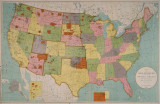| OCR Text |
Show REPORT OB SUPERINTENDENT OR INDIAN SCHOOLS. 421 and one who appreciates the teachers of the Indian m. I welcome yon on behalf of the hoard of education and invite you to visit some of the schoolhouses that will keep their doors open for our welcome visitors. In fact, the doors of every school-house in the city will open if you try to see what the hoard of education in St. Louis is doing for the white children. The doom of the schoolhouses are open now; the hearts of our citizens have been and are open to you at all times. 0reeting.-Miss Amelia 0. Fmchte, normal and high school, St. Louis, Mo.-Man years ago, when 1 read Shakes are's quotation ''I'll put?girdle round about the earti ~n forty minutes," it did not il",wn upon me that some tlme in this Middle West we would find a man who would do better, and would put a girdle around the earth in thirty minutes. Mr. Francis has put around this exposition a railway which in thirty minutes will take you around the world, as it were. Mr. Francis has enlisted the help and cooperation of all the races of the world. To me the most interesting of the exhibits is the lndian exlllbit. I believe if Pea-talozzi were here hia heart would throb for joy. I spent a number of delightful hours in the Indian boilding. I studied there the habitat of the race, and on the one side I saw at work the old Indians engrossed in the manufacture of their native wares, and on the other side we saw the young Indians ~cquiringt he art of control-ling themselves and fitting themselves for the responsibilities of citizenship. On behalf of the women teachem of St. Louis I welcome Miss Reel and all her friends and coworkers to the exposition, where we all together shall learn what I presume we all conceive to be the great lesson of life. (Iresting-Most Rev. John J. Glennon, Archbishop of St. Loois.-There have been so many greetings pr~nounceda nd so many welcomes extended that I am afraid that your convention will become altogether one of greeting^, because by the time the greetings are exhausted then will come the parting, instead of getting in the solid work. Perhaps, after all, this is better than to take thing8 too seriously, and I believe that most of our ~nvent ioncso nsist of a reeting and a parting. Perhaps thisis the sum total of life. We meet and greet an% part again-to meet again, 1 hope. I am dell hted to eee you to-day. As a friend of Indianedueation I greet you, and peause of consecrahon that I am sure is in your work you deserve a double p e t - mg. Speaking of consecration to your work, I do believe that it would not he unfair for me to say also that I greet you asarepresentative of achureh that hasgivenmany of its sonsand daughters to the,consecration and uplifting of the Indian race, and almost feel that I form here a kind of a bond between the past and the present-the past that is represented by those mission schools of the West-and I can almostfancy to-day I hear again the voice of some Gabriel or the monks of Santa Barharasum-moning their little flocks together, that they may teach them the truthsof knowledge and also those undying truths on which are based the consecration of the missionary board. Some of these missionaries are stillliving, and I an, glad to know that you and they are working together, for there is one bond of unity in our work. In his endeavors to go onward and upward we cangreet the inJan asa friend and as a brother, y d e r a common flag, in a mmmon nationality, under the standard of the Blessed Sav~oru, nder the standard of the Almighty, the common Father of us all. Besponsa.-Dr. W J .McGee, chief of department of anthropology, Louisiana Pur-chase Exposition.-It is a particular pleasure for me to accept on behalf of the Con-gress of Indian Educators, and on behalf of the department of anthropology as well, the greetings a~hieh have been so kindly extended this morning. It is true, as the fathers taught, that he is a. public benefactor who makes two blades of grass grow where one grew before; but it isequally true, as we, theirchildren, are learning, that he is a great benefactor who makes a spear of wheat grow wherea blade of grassgrew before. In other words, the great lesson of modern intellectual development is that it is not so much quantity that counts in the development of the world and in the development of our time as quality. And this is the lesson that has been taught in part by Indian education. Now, a word with respect to the red race. Let it not he imagined for a single moment that in dealing with the red race we Caucasians are dealing with an inferior type of mankind. Let it he understood that this type of mabkind indigenous to the Western Hemisphere is indeed noble; is indeed so noble and worthy that the law of intellectual interchange may benefit us who come in contact with them, just as they profit by contact with us. Think for a moment of some of the achievements and characteristics of our aboriginal landholders, of a race which formerly reigned over all this territory now occupied by our seventy millionsof people. Think of the leasons we have gained from it. Those of us whose headsare touched with the enow of time renrember thal admirable and notable example of the vorld's oratory, General Logan, chief of the Mingo tribe. Never have I seen an Indian child disobedient to or disrespectful toward its parents or anyone else. In this particular we may well profit by the example of this people. |












































































































































































































































